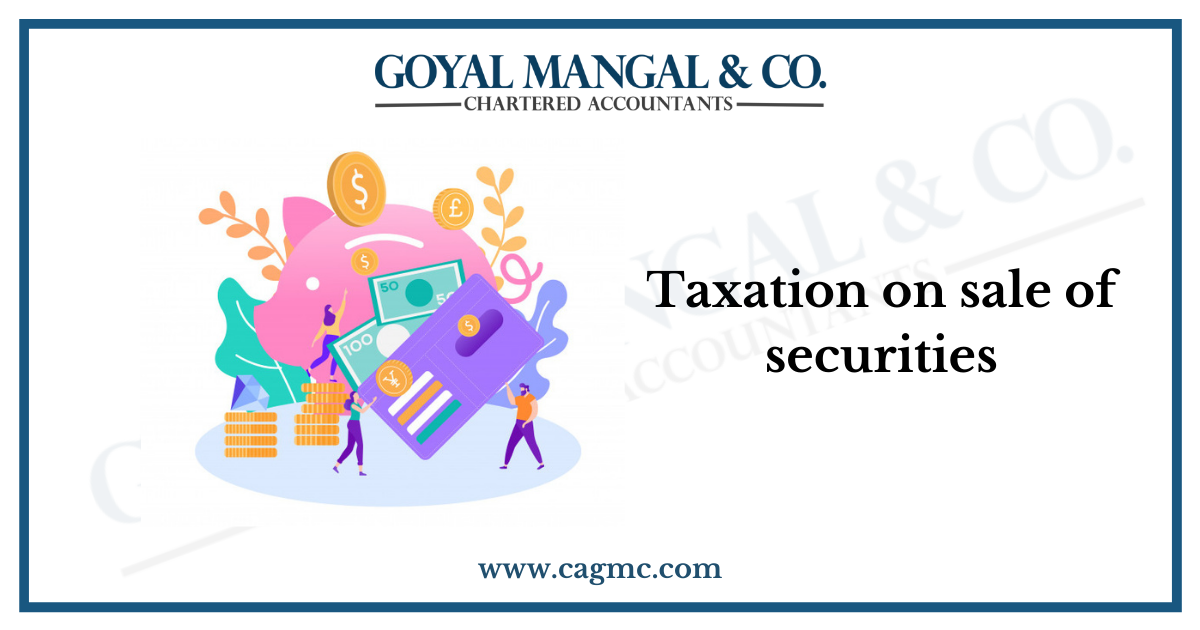As we all know that all income is charged in their respective heads like salary income is charged under salary head, rental income is charged under the head of house property, etc. So now question arises about income from sale or purchase of securities. Many stakeholders are unsure that whether the gain or loss of securities is treated as ‘Income from Business’ or ‘Income from Capital Gains’.

Whether the gain or loss of securities is treated as ‘Income from Business’ or ‘Income from Capital Gains
Some investors treat the gain or loss arising from sale of securities as business income while some treats gain or loss arising from sale of securities as capital gain.
Points that can be considered while deciding whether share or securities are treated as capital assets or stock in trade:
- The existence of power to purchase and sell the shares in MOA is not decisive factor that it is stock in trade.
- Quantum of purchase and sell of securities.
- Ratio between purchase and sell of securities.
- Holding period.
- Treatment of securities which assessee has given in his books of account.
- Intension of assessee whether to resale at profit, or to earn long term appreciation and dividend income.
- Method of valuation.
Treatment under head ‘Income from Business and profession’
In case a person is indulged in significant trading of securities then gain or loss arising from securities should be treated as Income from Business. In simple words we can say that if sale and purchase of security is business for the person then it will be taxable under head ‘income from business and profession’ and the security will be treated as stock in trade. If the sale of securities is treated as Business income, then the taxpayer is allowed to reduce expenses incurred while earning such income.
Income from sale of Securities that will be taxable under income from business and profession is speculative business income
What is speculative business income?
Income from speculative business means income generated from trading of commodities including stock and shares and settled by other than actual delivery.
Deduction of expenses under head ‘Income from business and profession’
The expenses that can be claimed if sale of security is treated as business income are:
- Deduction of Security transaction tax paid under section 36(1)(xv): STT is a tax paid on trading in securities like equity shares, equity mutual funds, ETFs, equity futures, equity options, etc. This expense can be claimed if sale of security is treated as business income.
- Stamp duty: Stamp duty is an expense on the transfer of securities. This expense can be claimed if sale of security is treated as business income.
Treatment under head ‘Income from Capital Gains’
Income generated from sale of securities will be taxable under head capital Gain if taxpayer do not trade under the securities and hold the securities as capital asset. If you treat the sale of securities as capital gains, then expenses incurred on transferring the securities shall reduce.
However, no deduction of STT shall be allowed in case taxpayer treated the securities as capital asset.
Deduction of expenses under head ‘Capital Gain’
The expenses that can be claimed if sale of security is treated as capital gain income are:
- Brokerage expenses: Brokerage is an expense that arises on transfer of securities. This expense can be claimed as a valid expense if sale of security is treated as capital gain income.
Types of Capital gain in case of securities
Under head income from capital gain, capital gain will be of two type:
| Capital Gain | Period of holding | Type of securities |
| Short term capital gain | Less than and equals to 12 months |
|
| Less than and equals to 24 months |
|
|
| Less than and equals to 36 months |
|
|
| Long term capital gain | More than 12 months |
|
| More than 24 months |
|
|
| More than 36 months |
|
Rate of Tax on Short term capital gain
| Section | Sale of security | Rate of tax |
| 111A | Listed equity shares
Unit of equity oriented fund |
15% (If STT paid on sale) |
Note: If STT is not paid on transfer of such securities than gain will be taxable at the normal tax rate.
Rate of Tax on Long term capital gain
| Section | Sale of security | Rate of tax |
| 112A | If income exceeds 100,000 from transfer of:
Listed equity share Unit of equity oriented fund |
10% (if STT paid on sale) |
| 112 | Unlisted securities and shares of closely held company | Non-corporate, non-resident/ foreign company– 10% without indexation benefit. |
| Other Assessee– 20% with Indexation benefit | ||
| Listed securities (other than unit) or a zero coupon bond | 10% without indexation benefit
20% with indexation benefit Whichever more beneficial to taxpayer
|
Clarification from CBDT
In case of listed shares, taxpayers have now been offered a choice how they want to treat such income but once they choose, they must have to follow the same method in subsequent years.
CBDT has issued the following instructions (CBDT circular no 6/2016 dated 29th February 2016)-
- If the taxpayer chooses the security as stock – in- trade, then the income shall be treated as business income irrespective of holding of listed securities. The AO shall accept this stand chosen by the taxpayer.
- If the taxpayer chooses to treat the income as capital gains, the AO shall not put it to dispute and this is applicable for listed securities hold for a period of more than 12 months.


